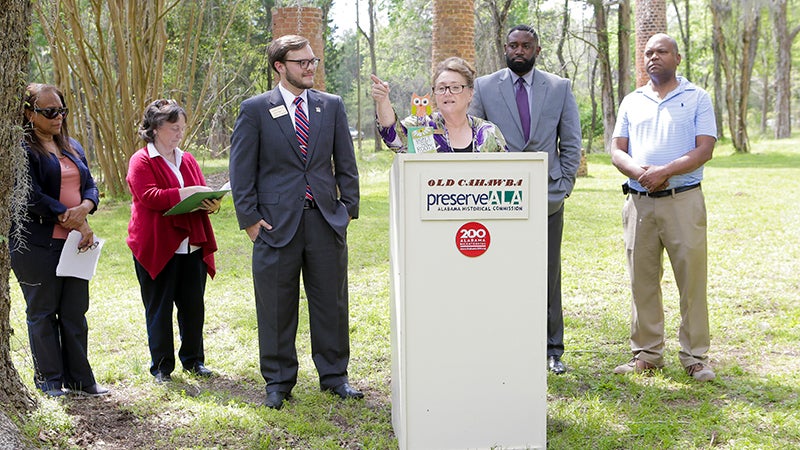Bicentennial kicked off at first capital
Published 9:30 pm Tuesday, March 28, 2017

- A local committee organized to plan the state and Selma’s bicentennial held a kickoff event Tuesday at Old Cahawba Archaeological Park. Shown left to right is B.J. Smothers, Martha Lockett, Landon Nichols, Linda Derry, Kennard Randolph and Michael Jackson.
With Alabama’s bicentennial quickly approaching, the local celebration committee held a kickoff Tuesday at Old Cahawba to let the public know their plans and ways to celebrate the state turning 200.
“We are thrilled to be kicking off the local celebrations for Selma and Dallas County in Alabama’s bicentennial,” said Landon Nichols, a member of the committee. “This is a really exciting event for us to be able to bring the community together and talk about our past 200 years of heritage and where we want to go in our next 200.”
Alabama was founded Dec. 14, 1819, and Selma was founded shortly after in 1820. The states celebration will be split up over three years, starting in 2017 with recognizing places. It will continue in 2018 by honoring people and end in 2019 with telling the state’s stories. But the Selma-Dallas County 200 Community Celebration Committee decided to add an extra year to the state’s plan. In 2020, the celebration will focus solely on Selma.
The kick-off was held at Old Cahawba because of its significance in Alabama’s history, being the state’s first capital.
“This event is hugely symbolic at Cahawba,” Nichols said. “Cahawba is the cradle of civilization not only in Dallas County but in the state of Alabama. To be able to come back to this place at the confluence of the Alabama and Cahaba Rivers to commemorate this anniversary is very exciting.”
Linda Derry, site director at Cahawba, said she felt that it was appropriate for the kickoff to be held at Old Cahawba.
“We appreciate the fact that the committee saw this as the natural place to have the kickoff,” Derry said. “I think it just naturally belongs here because this is the place or origin for all of Dallas County. Just about everything that began in Dallas County, began here at Old Cahawba.”
The state set aside $1,000 for each of the 67 counties to use for their celebrations, and the committee decided to use that money as a tool to raise more funds for larger projects throughout the four-year celebration.
“We are looking at taking the small seed funding from the state and developing some commemorative packs of notecards,” Nichols said.
“We really want to focus in 2017 with these notecards on the places that made Selma and Dallas County.”
Martha Lockett, a member of the committee, said the committee is looking for local artists that would like to donate time and creativity to make these notecards to help generate revenue.
“The first project that we’re going to do is to work with local artists to curate a set or multiple sets of commemorative notecards of the places in Dallas County. Hand drawn cards of churches, buildings or places,” Lockett said. “We want to develop as many of these sets as we can and use as many local artists as we can.”
Nichols said he was excited to start the process and get the community involved.
“We’re just really excited to roll out our plans and get people engaged in the bicentennial,” Nichols said. “This isn’t about us. This is your bicentennial. We really want people to own the event and own the celebration. Have family reunions, research your genealogy have class and church reunions, really come back to who we are as Alabamians and honor that history.”
Derry said she is looking forward to the summer, when a team of archeologists will be digging in to research the original statehouse.
“This summer we’re going to be opening up the site of Alabama’s first statehouse, and we’re really anxious to find out what there is to be told about those early legislators there,” Derry said. “I’ve been here 30 years, and I’ve been wanting to work on the statehouse as an archaeologist, and I’m finally getting this opportunity … so I’m very excited about that.”
Derry said overall she hopes the bicentennial will bring even more visitors to the area to see what was once a thriving community set on the Alabama and Cahaba rivers.
“This is such an amazing place,” Derry said. “I hope the bicentennial brings more people to come visit it and realize what a great place Old Cahawba is.”





